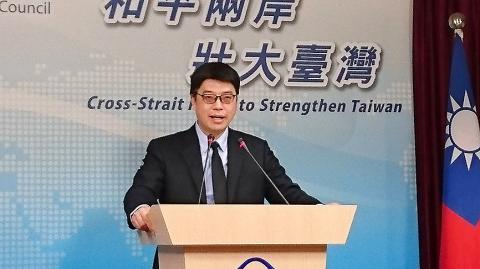The Chinese government’s new residency permit cards for Taiwanese, which are to bear the fingerprints of the cardholder, pose privacy and national security risks, Executive Yuan Department of Cybersecurity Director Jian Hong-wei (簡宏偉) said yesterday.
Jian made the remarks after Chinese authorities earlier in the day published a preview of regulations for issuing residency permit cards for people from Taiwan, Hong Kong and Macau, which are to go into effect on Saturday next week.
The cards would bear the cardholder’s name, date of birth, photograph, fingerprints, address and an 18-digit serial number, employing the same identification system Beijing uses for Chinese nationals, according to the regulations.

Photo: Chung Lee-hua, Taipei Times
“Fingerprints are private biometric data and there is no end to the ways Chinese authorities could use them once they get hold of them,” Jian said.
After obtaining fingerprints of Taiwanese, the Chinese government could link them to other biometric data and store them in digital archives, he said.
Taiwanese who give their biometric data to Chinese authorities would render themselves vulnerable to Beijing’s human rights violations, he added.
Mainland Affairs Council Deputy Minister Chiu Chui-cheng (邱垂正) said the increasing power and sophistication of Chinese surveillance technologies pose potential risks to Taiwanese seeking employment or education in China.
President Tsai Ing-wen (蔡英文) on Saturday said China’s issuance of residency permits to Taiwanese is “motivated by a certain political agenda.”
China’s Taiwan Affairs Office and the Ministry of Public Security said that with the new residency permit, people from Taiwan, Hong Kong and Macau would be identified with a six-digit address code starting with 83, 81 and 82 respectively.
People from Taiwan, Hong Kong and Macau may apply for a residency permit if they are employed in a stable job, have lived in China for at least half a year, have a permanent place of residence and satisfy at least one requirement for continuing education, the agencies said.
Taiwanese who have held a Taiwan Compatriot Permit for at least five years may directly apply for a permit, they said.
The permits would record data about the issuing office, and border entry and exit dates, they added.
The Mainland Affairs Council issued a statement later in the evening, saying that it would investigate whether applying for a residency permit in China contravenes the Act Governing Relations Between the People of the Taiwan Area and the Mainland Area (臺灣地區與大陸地區人民關係條例).
Article 9 of the act forbids Taiwanese nationals to hold China-issued household registration documents or a passport at the pain of losing Republic of China citizenship and its rights and privileges.
China is a repressive regime with a poor human rights record and the public should consider the consequences before surrendering sensitive personal data to Beijing, Democratic Progressive Party Legislator Wang Ding-yu (王定宇) and Taiwan Association for Human Rights policy director Shih Yi-hsiang (施逸翔) said separately.

Nvidia Corp yesterday unveiled its new high-speed interconnect technology, NVLink Fusion, with Taiwanese application-specific IC (ASIC) designers Alchip Technologies Ltd (世芯) and MediaTek Inc (聯發科) among the first to adopt the technology to help build semi-custom artificial intelligence (AI) infrastructure for hyperscalers. Nvidia has opened its technology to outside users, as hyperscalers and cloud service providers are building their own cost-effective AI chips, or accelerators, used in AI servers by leveraging ASIC firms’ designing capabilities to reduce their dependence on Nvidia. Previously, NVLink technology was only available for Nvidia’s own AI platform. “NVLink Fusion opens Nvidia’s AI platform and rich ecosystem for

WARNING: From Jan. 1 last year to the end of last month, 89 Taiwanese have gone missing or been detained in China, the MAC said, urging people to carefully consider travel to China Lax enforcement had made virtually moot regulations banning civil servants from making unauthorized visits to China, the Control Yuan said yesterday. Several agencies allowed personnel to travel to China after they submitted explanations for the trip written using artificial intelligence or provided no reason at all, the Control Yuan said in a statement, following an investigation headed by Control Yuan member Lin Wen-cheng (林文程). The probe identified 318 civil servants who traveled to China without permission in the past 10 years, but the true number could be close to 1,000, the Control Yuan said. The public employees investigated were not engaged in national

CAUSE AND EFFECT: China’s policies prompted the US to increase its presence in the Indo-Pacific, and Beijing should consider if this outcome is in its best interests, Lai said China has been escalating its military and political pressure on Taiwan for many years, but should reflect on this strategy and think about what is really in its best interest, President William Lai (賴清德) said. Lai made the remark in a YouTube interview with Mindi World News that was broadcast on Saturday, ahead of the first anniversary of his presidential inauguration tomorrow. The US has clearly stated that China is its biggest challenge and threat, with US President Donald Trump and US Secretary of Defense Pete Hegseth repeatedly saying that the US should increase its forces in the Indo-Pacific region

ALL TOGETHER: Only by including Taiwan can the WHA fully exemplify its commitment to ‘One World for Health,’ the representative offices of eight nations in Taiwan said The representative offices in Taiwan of eight nations yesterday issued a joint statement reiterating their support for Taiwan’s meaningful engagement with the WHO and for Taipei’s participation as an observer at the World Health Assembly (WHA). The joint statement came as Taiwan has not received an invitation to this year’s WHA, which started yesterday and runs until Tuesday next week. This year’s meeting of the decisionmaking body of the WHO in Geneva, Switzerland, would be the ninth consecutive year Taiwan has been excluded. The eight offices, which reaffirmed their support for Taiwan, are the British Office Taipei, the Australian Office Taipei, the